| |
NECE NEWSLETTER 02 | 2020
Editorial
Dear Colleagues,
several months after the outbreak of the corona pandemic, we are far from normality in the way we live and work. Many people continue to face uncertainty. The world is changing in dangerous ways: Authoritarian ‘power grabs’ are threatening the rule of law and democracies all over the world. Inequalities are increasing and educational gaps are widening. Geopolitical conflicts are threatening transnational and global collaboration. More than ever, citizenship education is needed to promote resilience and self-efficacy of citizens in a complex world.
NECE 2020 is taking on these challenges. This special edition of our Newsletter shows examples how NECE partners as well as corresponding networks in Eastern Europe and Africa rose to the challenge with new and creative practices of online education and communication. We recommend our readers to these moving and encouraging stories which can widen our horizons.
Please find out more stories by tuning in to the new international format bpb:connect of the German Federal Agency for Civic Education (bpb) available on our website.
Stay tuned, stay well and join NECE 2020!
Christoph Müller-Hofstede (Federal Agency for Civic Education/bpb)
Anja Ostermann plus the NECE Team of labconcepts (Bonn/Berlin)
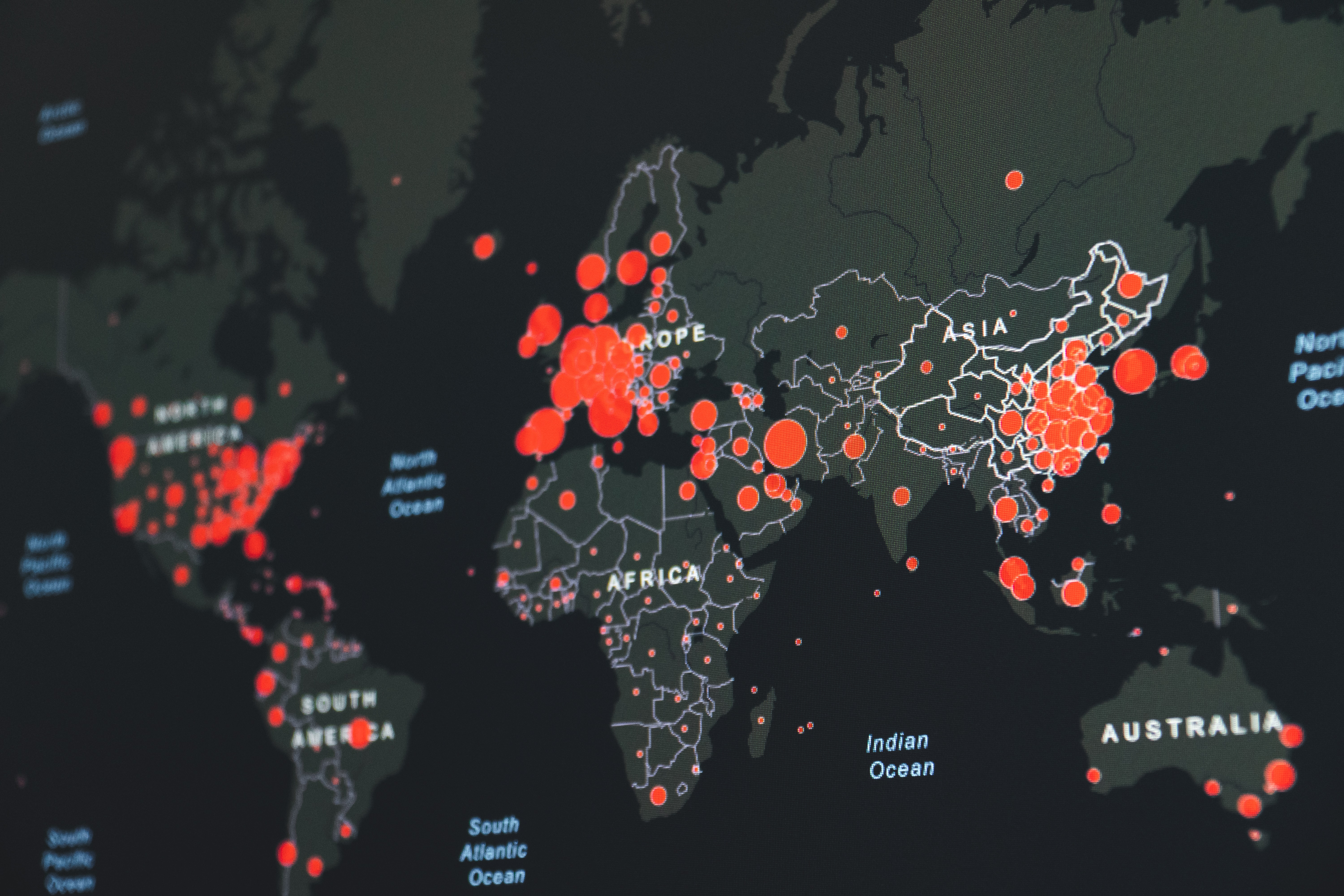
(Photo by Martin Sanchez, Unsplash)
|
|
 |
| |
NEWS about NECE |
|
 |
| |
NECE 2020 – #digitalNECE: Reconnecting in a Post Pandemic World. Citizenship Education for Democracy and Sustainability.
SAVE THE DATE
5 – 7 November 2020, Berlin, Germany
In November NECE 2020 will be held in Berlin against the background of the German EU Presidency and its goals to open up new channels for citizen’s participation in Europe. NECE 2020 will be a hybrid event with as many real-life meetings as possible and numerous digital channels. It will create spaces for transnational networking, learning and building a collaborative spirit among the often fragmented actors in citizenship education and civil society.
Hosted by the Federal Agency for Civic Education (bpb), its European NECE partners and corresponding networks in eastern Europe and in Africa, the conference and preparatory meetings will be supported by other important networks such as DARE the European Network for Democracy and Human Rights. Major civic foundations such as Stiftung Mercator and Robert Bosch Stiftung as well as the Goethe-Institut, the German Council for Sustainable Development (RNE), ‘Bridge 47’ lifelong learning project and think tanks such, ‘Das Progressive Zentrum’ and ‘Zentrum für Liberale Moderne’ in Berlin will be presenting their inputs and work – off- and online!
NECE 2020 will kick-off on June 10 with a digital dialogue and roundtable with Thomas Krüger (President of the bpb), Marc-Oliver Pahl (General Secretary of the German Council for Sustainable Development), Paulina Fröhlich (Das Progressive Zentrum) and other speakers (in German language).
A webinar on June 11 will discuss ‘Restarting Europe: The role of civil society and citizenship education’ (English language).
From July until October, NECE 2020 will run a series of webinars, a barcamp and participatory digital dialogues exploring the topics and formats of the conference in Berlin. Trainings and Webinars presenting tools for citizenship education in the virtual world will be an essential part of the process leading to the event in November.
More information about goals and ideas for the conference on our website soon.
Follow NECE on Twitter and check out the NECE Facebook page! Share your stories and projects via Social Media using our Hashtag #digitalNECE.
If you have any questions, please do not hesitate to contact the conference organisers via email: nece-conference2020@labconcepts.de
|
|
| | |
COPING WITH THE LOCKDOWN: Best Practices from Luxembourg to Uganda
| |
 |
| |
NECE partners and corresponding networks talk about their best practice:
bpb:connect: New platform launched in April 2020
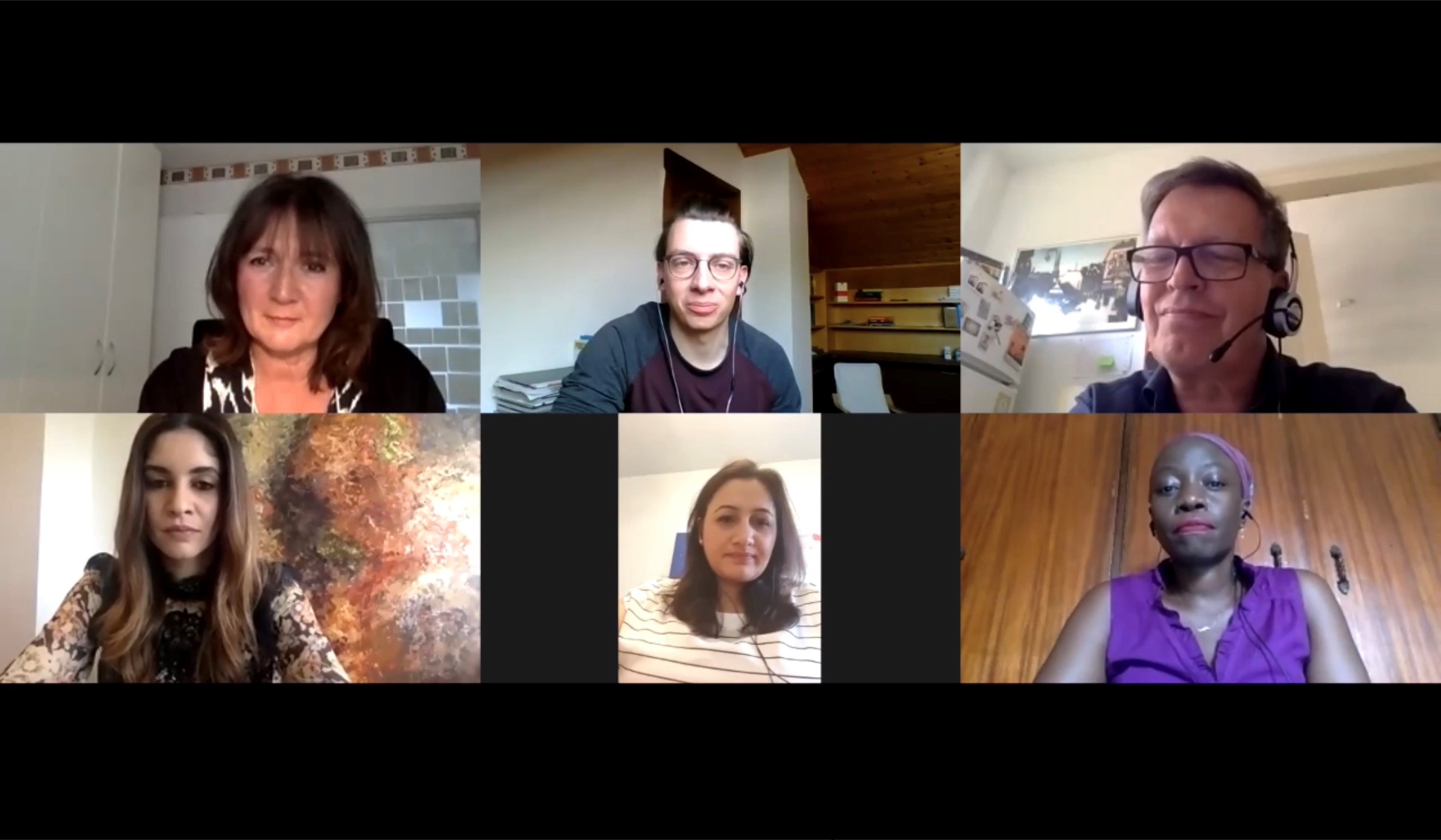 The global Corona crisis shows yet again that we live in an interdependent world and that today’s challenges don´t stop at national borders and that they demand transnational responses. That’s the reason why the German Federal Agency for Civic Education wants to bring all of you together! To connect with experts and stakeholders from different regions and to take up international co-operations and debates on our new online platform: bpb:connect. The platform started with a kick-off event in April 2020, together with NECE and the sister Networks NACE, EENCE and CENESA. Next events will be announced via www.bpbconnect.eu – Stay connected! (Image: ©bpb).
The global Corona crisis shows yet again that we live in an interdependent world and that today’s challenges don´t stop at national borders and that they demand transnational responses. That’s the reason why the German Federal Agency for Civic Education wants to bring all of you together! To connect with experts and stakeholders from different regions and to take up international co-operations and debates on our new online platform: bpb:connect. The platform started with a kick-off event in April 2020, together with NECE and the sister Networks NACE, EENCE and CENESA. Next events will be announced via www.bpbconnect.eu – Stay connected! (Image: ©bpb).
|
|
| |
Luxembourg supports citizenship education with various educational offers and a propaganda guide to prevent manipulation
In view of the current situation, the Luxembourg-based Zentrum fir politesch Bildung (ZpB) has adapted and expanded its educational offer. The ZpB has put online numerous videos, educational activities and worksheets on democracy in Luxembourg, on COVID-19 and other current topics! All educational material in Luxembourgish, German, French or English is aimed at children and young people and can be downloaded free of charge by teachers, educators or parents. Also, the suggested solutions for each worksheet are available for download.
| |
| |
Information or Manipulation? – A propaganda guide
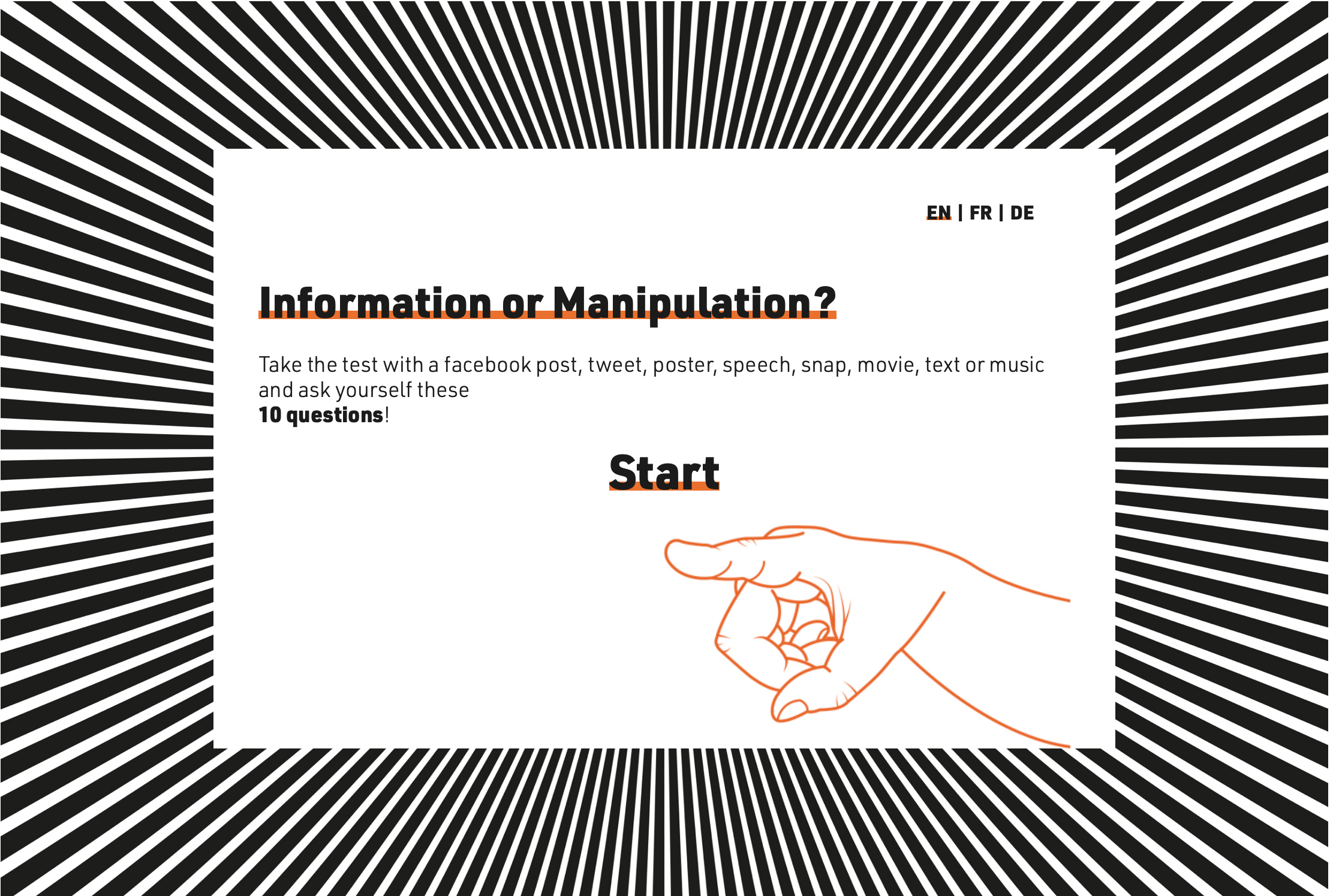 In times of COVID-19, false information or conspiracy theories are circulating in social networks or various chat programs. Often, these misleading messages are difficult to distinguish from reliable information. The website propaganda.guide by the Zentrum fir politesch Bildung helps to expose false information or conspiracy theories. Based on 10 questions, one gets an impression of whether the author of a message wants to provide information or push the reader in a certain direction. Propaganda guide is available in English, French and German. For teachers and educators, there is also an educational booklet, available at www.zpb.lu. (Image: ©ZpB)
In times of COVID-19, false information or conspiracy theories are circulating in social networks or various chat programs. Often, these misleading messages are difficult to distinguish from reliable information. The website propaganda.guide by the Zentrum fir politesch Bildung helps to expose false information or conspiracy theories. Based on 10 questions, one gets an impression of whether the author of a message wants to provide information or push the reader in a certain direction. Propaganda guide is available in English, French and German. For teachers and educators, there is also an educational booklet, available at www.zpb.lu. (Image: ©ZpB)
| |
| |
Citizenship Days in Austria: The 2020 Days become #eCitizenshipDays
Due to the COVID-19 pandemic, the annual Austrian Citizenship Days 2020 had to be staged as an e-campaign. A virtue was made out of necessity: from 23 April to 9 May, polis – the Austrian Centre for Citizenship Education in Schools – provided daily digital offers to teachers and other multipliers, including online lessons, video lectures, podcasts, digital work packages for students, quizzes, thematic compilations, “Corona radio”, a “Corona thriller”, a COVID-19 contemporary witness project for students (“At that time we stayed at home”) and more. The campaign was a booster for new formats in the polis portfolio and will have a sustainable impact on the further development of digital citizenship education projects in Austria. It led to new partnerships in cooperation and once again showed that central providers of citizenship education have to do both – develop their own materials and training formats, and act as a platform that enables and fosters innovation and experimental formats. Find out more at: www.politik-lernen.at/aktionstage (only in German).
| |
| |
Leadership Development Association Balkan uses creativity to cope with the crisis
Dasara Uka is a student at the Agricultural University of Tirana in Albania. She proactively shares her student perspective on the quarantine in “The bright side of the quarantine”. The LDA Balkan also created an educative and informative video called “A Quarantine Day”. Have a look at how online lessons are run in Albania – an Albanian schoolchild prepared this video message on how lessons have shifted online.
| |
| |
INSIDES FROM EENCE (Eastern European Network for Citizenship Education)
| |
 |
| |
Working process during Covid-19
The EENCE working process continues as planned during the lockdown. The Network member country organizations have changed their strategy and transferred most of the activities online. The projects of the Working Groups have moved to online platforms and are using different methodologies such as blended learning and online training to continue the cross-country collaboration and realization of activities such as database clean-ups, website improvements, announcements of social media contests, international collaboration with the sister Networks. In particular, the Working Group "Fostering democratic citizenship through human rights and history education" has kicked off online successfully. The preparation of the week of citizenship education entitled "Art of leaving together" (05.–11.10.2020) carries on with the great enthusiasm of the Network members. The recent "Kick-off webinar for bpb:connect" was another opportunity for EENCE to talk about the pandemic influence on a national level and analyse the situation of CE in the member countries. EENCE members participated in the histoCON and got great observations on the World War II which has significantly impacted the history of each EENCE member countries. You can find more information on the recent activities of the EENCE in this Newsletter and on www.bpb.de/eence.
| |
| |
Citizenship Education in the Republic of Armenia
The Government of the Republic of Armenia has been quite proactive in addressing the overall pandemic issues and concerns of the nation. The most important and necessary information is officially posted on the Government's website with details on addressing the social and economic impacts. The confirmed cases of COVID-19 in RA are more than 3300 as of May 10, 2020. Accordingly, the aspects of Education were also highly impacted in the country both in the formal and non-formal fields. We can definitely state the fact that the educational institutions were not ready to face the challenge of Distance teaching/learning at all. With the beginning of the state of emergency in the country, the public institutions had a quite hard time in organizing the usual education processes online in benefit to learners within a short time period: schools and universities were not equipped enough with tools and devices, the staff was not trained enough to face the challenge of online teaching/learning. Despite this fact, the RA Ministry of Education, Science, Culture, and Sports launched within a week a quick distance learning platform to organize the process of online learning in secondary schools. New TV applications and social media platforms were put in place to provide the broadcasting of special school classes countrywide. The non-formal education field organizations and experts were on the contrary quite flexible in acting as necessary: many of the organizations switched to online training and initiated lots of social activities to help people in need, as well as to train people on how to survive the pandemic. Volunteering emerged hugely showing up the level of civic consciousness amongst all layers of society. Based on the active engagement of NGOs the Government carried out a number of actions and programs to provide nationwide support to the citizens. The lessons learned so far are that citizenship education in the country still needs more risk mitigation strategies and trained professionals to act with urgency during unforeseen situations.
| |
| |
INSIDES FROM NACE (Networking Arab Civic Education)
| |
 |
| |
Threats for citizenship education and democracy in Egypt
The role of citizenship education practitioners in times of uncertainty and post pandemic should find the right balance between self-learning and community interaction. We should come up with innovative, equitable, and inclusive approaches and tools to ensure that citizens and communities are more resilient to global civic crisis through re-modelling of conventional learning tools for a more equitable society. Find out more about the case of Egypt.
| |
| |
INSIDES FROM CENESA (Civic Education Network in Eastern and South Africa)
| |
 |
| |
Are citizenship education and respect for human rights still possible during Covid-19?
A response to the crisis and it’s challenges in Uganda, written by Sheila Nabachwa (CENESA). Read here.
| |
| |
Uraia: Kenya’s National Civic Education Programme
From the onset of the Covid-19 pandemic in Kenya, Uraia shifted its citizenship education programming to focus on a public education campaign on Covid-19. Due to restrictions on public gatherings the campaign is largely conducted through the use of social media and in the form of online posters and audio comedy clips addressing the various social and public health aspects of the disease. See more about the programme and it’s activities to cope with the crisis.
| |
| |
South Africa responding to Covid-19
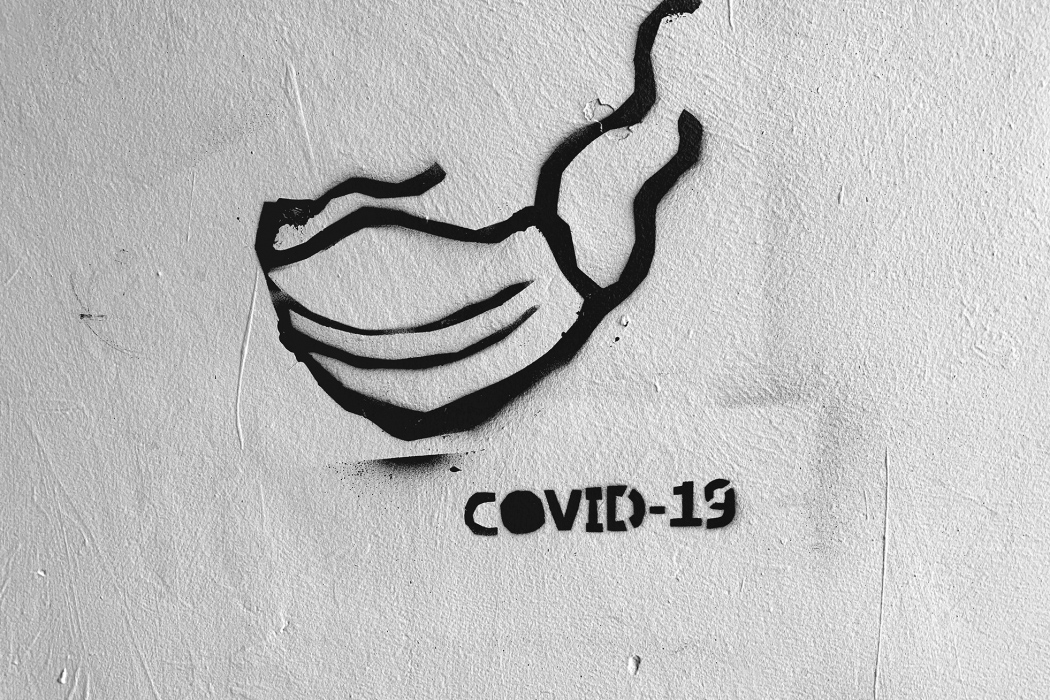 Mira Dutschke member of CENESA’s Interim Steering Committee reports: Democracy Works Foundation (DWF) is a southern African non-profit company with headquarters in South Africa, which promotes and develops inclusive, equitable and sustainable consensus democracies. The Covid-19 disaster response grants the executive wide powers and significant amounts of money have been allocated. For these reasons, guarding democratic freedoms, institutions and structures has never been more important. The DWF team has quickly responded to the crisis. Read more. (Image: ©DWF)
Mira Dutschke member of CENESA’s Interim Steering Committee reports: Democracy Works Foundation (DWF) is a southern African non-profit company with headquarters in South Africa, which promotes and develops inclusive, equitable and sustainable consensus democracies. The Covid-19 disaster response grants the executive wide powers and significant amounts of money have been allocated. For these reasons, guarding democratic freedoms, institutions and structures has never been more important. The DWF team has quickly responded to the crisis. Read more. (Image: ©DWF)
| |
| | |
New Networks and Initiatives for Citizenship Education in Europe
| |
 |
| |
Leadership Development Association Balkan
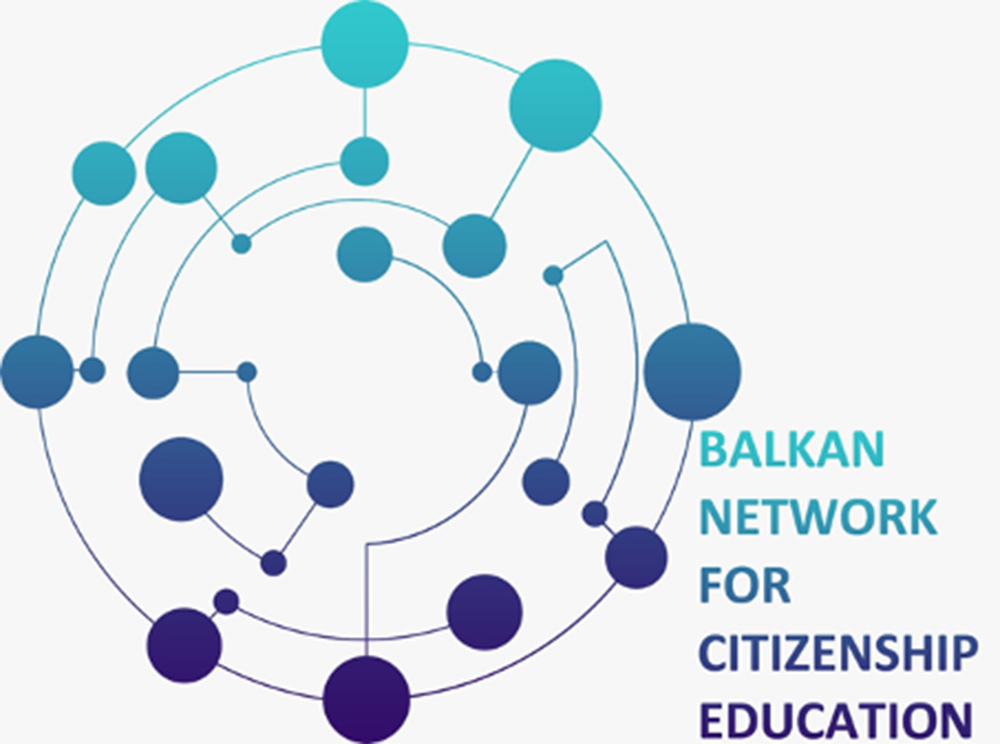 Founded in 2017, LDA Balkan is an NGO run by young professionals, focused on leadership, democracy, good governance, entrepreneurship, technology & innovation and professional growth. LDA Balkan works towards empowering citizenship education and creating an equal society in Albania. Thank you for the invitation to cooperate with the NECE network, we are looking forward to interconnecting our work. Find out more about the LDA Balkan.
Founded in 2017, LDA Balkan is an NGO run by young professionals, focused on leadership, democracy, good governance, entrepreneurship, technology & innovation and professional growth. LDA Balkan works towards empowering citizenship education and creating an equal society in Albania. Thank you for the invitation to cooperate with the NECE network, we are looking forward to interconnecting our work. Find out more about the LDA Balkan.
| |
| | |
GOOD PRACTICE IN TIMES OF CRISIS
| |
 |
| |
Planpolitik provides innovative and interactive citizenship education
Planpolitik applies its expertise in interactive political citizenship education through Senaryon, an online platform for simulation games. Senaryon offers the possibility to act in different roles, such as politicians, citizens or representatives of civil society, in order to experience political structures. Find out more!
| |
| |
KU LEUVEN: Case 4EU defending civil rights and responsibility in society
The innovation project at University of Leuven is developing new pedagogical content and methods for EU learning in secondary schools. It runs until 28 February 2021. The project’s work becomes even more important in times of Corona when considering how political measures are affecting civil rights. Read more about Case4EU !
| |
| |
European Civic Forum: 10 lessons learned from the crisis
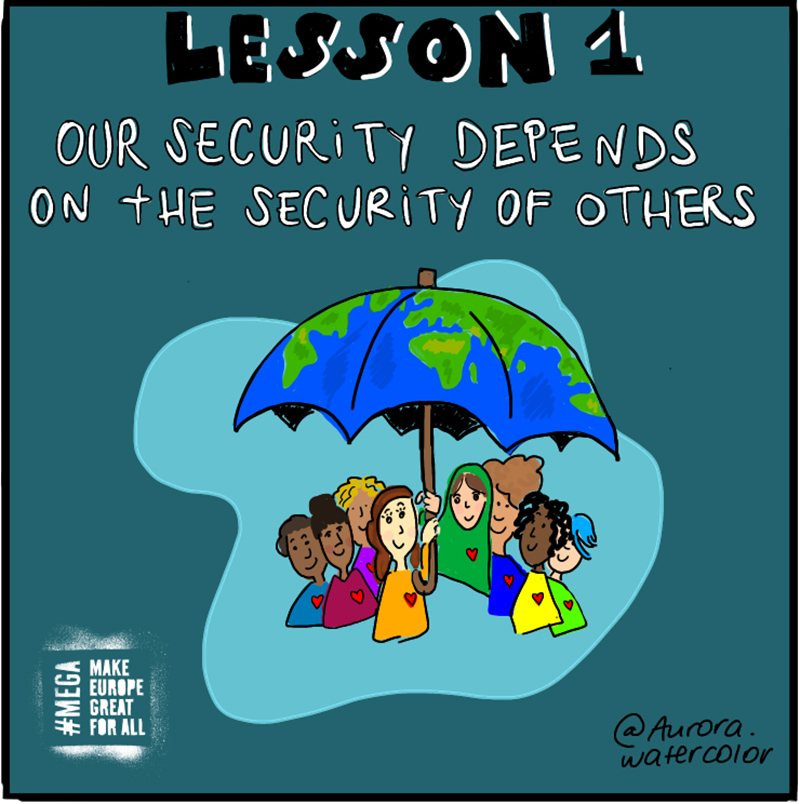 The European Civic Forum is looking at how institutions, NGOs or citizens are responding to the crisis and the challenges and difficulties we all are confronted with. They give visibility to civic society’s actions concerning the present crisis to support the demands they are putting to European institutions. The Forum created a list of 10 lessons for the future. Find out more. (© Illustration of European Civic Forum)
The European Civic Forum is looking at how institutions, NGOs or citizens are responding to the crisis and the challenges and difficulties we all are confronted with. They give visibility to civic society’s actions concerning the present crisis to support the demands they are putting to European institutions. The Forum created a list of 10 lessons for the future. Find out more. (© Illustration of European Civic Forum)
| |
| |
Innovation in Politics: Supports politicians to achieve results by breaking new grounds and using their creativeness
The current situation creates a lot of confusion in a broad range of policy areas. But confusion can also be the mother of innovation. What is happening now in terms of self-organisation in one context has the potential to be implemented elsewhere. Read more.
| |
| |
Launch of the Franco-German Citizens’ Fund
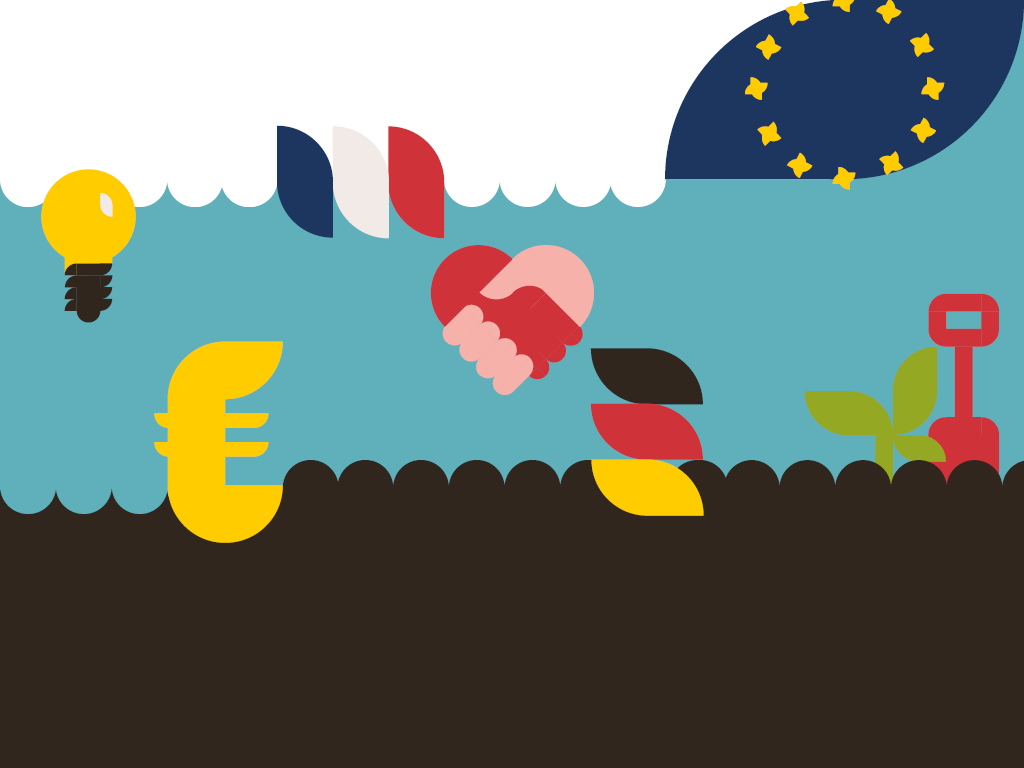 Major challenges can only be overcome together. The Franco-German Citizens’ Fund strengthens civil societies in Germany and France and brings them closer together in times of crisis. Find out more. (© Illustration by Deutsch Französischer Bürgerfonds)
Major challenges can only be overcome together. The Franco-German Citizens’ Fund strengthens civil societies in Germany and France and brings them closer together in times of crisis. Find out more. (© Illustration by Deutsch Französischer Bürgerfonds)
| |
| |
Citizens Take Over Europe: Alliance for a European Citizens Conference
European Alternatives is co-ordinating a long-term project involving a collective of European CSOs, entitled Citizens Take Over Europe. Citizens Take Over Europe aims to be a two-year effort and process to develop a European Citizens Conference; the modalities and a timeline are currently under development. They have just launched the website.
| |
| |
You want to become a Corona democracy reporter for your country?
The International Democracy Community is a global network working with activists and experts all over the world. Now they are calling for information about the current situation and the measures established in response to Covid-19 in every country. Share your experiences and become a Corona reporter. Have a look at the map to see for which countries information has already been submitted. Find out more.
| |
| |
European Symposium on the Development of Critical Youth Citizenship
JUGEND für Europa and its project Critical Youth Citizenship intends to promote committed, democratic and critical young people through an interdisciplinary symposium. The aim is to create an interactive platform for a professional discussion and analysis of the political dimension of youth work. More information here.
| |
| | |
CORONA OFFERS: Podcasts and Further Readings
| |
 |
| |
The Another Europe Podcast: Coronavirus and its effects and challenges
Check out the Another Europe podcast where experts and scientists talk about current topics during the Corona crisis. All episodes are available here.
| |
| |
Podcast: Co-operation or conflict?
David Runciman and Helen Thompson talk to Hans Kundnani, from Chatham House, about whether the Covid-19 pandemic is pushing the world together or driving it further apart. Listen here.
| |
| |
Who decides on fundamental restrictions of basic rights?
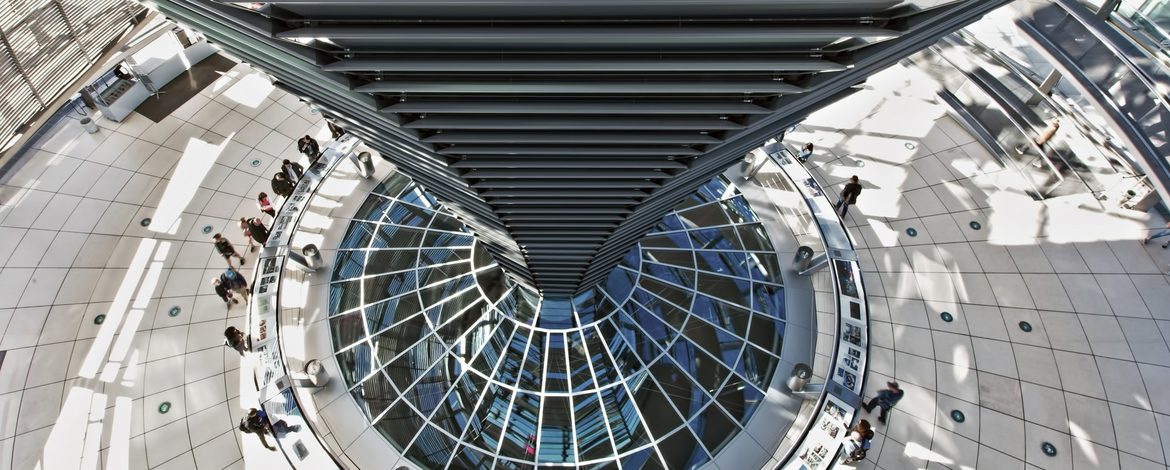 Bearing in mind the current situation, which decisions and restrictions of fundamental rights can still be considered legitimate in a democracy? A contribution by Wolfgang Merkel. (Image: © Ricardo Gomez Angel/Unsplash.com)
Bearing in mind the current situation, which decisions and restrictions of fundamental rights can still be considered legitimate in a democracy? A contribution by Wolfgang Merkel. (Image: © Ricardo Gomez Angel/Unsplash.com)
| |
| |
Beware of viral enabling acts by Jan-Werner Müller, Princeton University (Member of the NECE Advisory Board)
How does the coronavirus affect governmental power and opposition parties? New leaders often benefit from times of crisis, but “autocratization” can also threaten democratic states, for example when measures that were introduced because of an emergency are kept on permanently. Read more.
| |
| |
Populism and its popularity during Corona
Three aspects of illiberal populism’s success in the twenty-first century and possible responses by Jaroslaw Kuisz and Karolina Wigura (Member of the NECE Advisory Board). Download and read the whole article.
| |
| |
EUObserver: Has European Democracy been “infected” by the virus?
Why some EU members introduced a state of emergency and others didn’t and what advantages can be made out during the Corona crisis. Read the article by Eszter Zalazan.
| |
| |
Is the coronavirus changing our world permanently?
 The Politico Magazine published a guide that describes possible changes in society, for example in government, health care, the economy and individual lifestyles in response to the coronavirus crisis. Read more about how the pandemic could change our world in the long run. (©Politico Magazine, Illustration by DAQ).
The Politico Magazine published a guide that describes possible changes in society, for example in government, health care, the economy and individual lifestyles in response to the coronavirus crisis. Read more about how the pandemic could change our world in the long run. (©Politico Magazine, Illustration by DAQ).
| |
| |
Visions of a post-Corona world
The impact of the crisis on political and economic structures could either lead us to a turning point or intensify and consolidate existing trends. Dani Rodrik thinks the latter is more likely. Read the whole article.
| |
| |
Can Corona help us to reach climate neutrality and a better future?
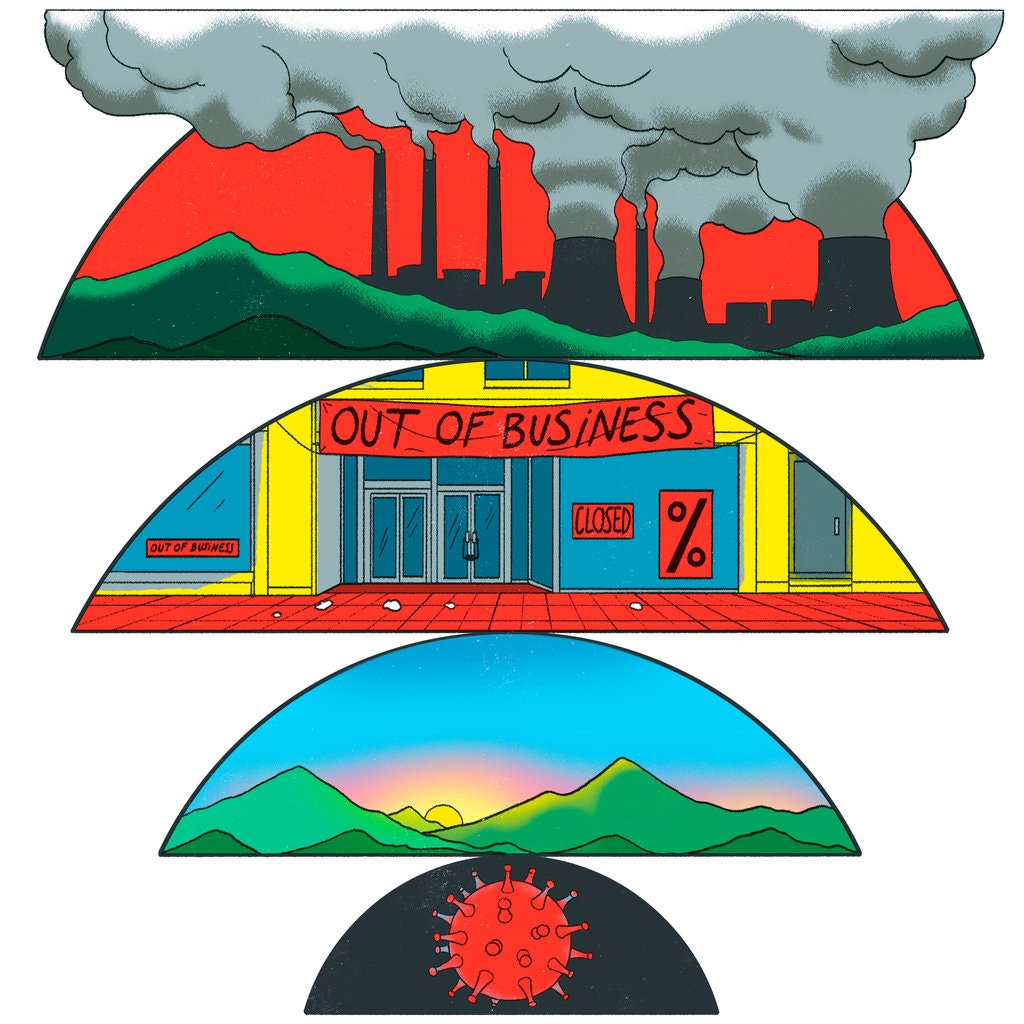 The pandemic not only caused lockdowns, economic losses and health system collapses but also permits the global environment to take a deep breath. Clean air, less carbon emissions and less polluted cities are only some effects of the measures taken because of the virus. Read more in the article by Meehan Crist. (Image: © Christina Daura)
The pandemic not only caused lockdowns, economic losses and health system collapses but also permits the global environment to take a deep breath. Clean air, less carbon emissions and less polluted cities are only some effects of the measures taken because of the virus. Read more in the article by Meehan Crist. (Image: © Christina Daura)
| |
| |
Please note: Any links provided are for information and discussion only. The views
expressed are not necessarily shared by NECE as a networking platform.
| |

|
| |
Wanted: Your Contribution to the NECE Newsletter!
|
|
 |
| |
Are you involved in citizenship education in Europe or North Africa? Are you running projects aimed at promoting democratic values and tolerance in your country or region? Do you think NECE (and the readers of this Newsletter) should know about your project and do you want to enlist their support/advice? We’d love to hear from you! Send your contributions, ideas, comments, and questions to: nece-newsletter@labconcepts.de or share your stories and projects via Social Media using our Hashtag #digitalNECE.
|
|
 |
| |
|
|
 |
| |
You are receiving the NECE Newsletter because you subscribed and have confirmed that you wish to receive information about the NECE-Networking European Citizenship Education initiative. To unsubscribe please click here.
The NECE Newsletter is published regularly and distributed via e-mail. It is available to anyone on the www.nece.eu website. The newsletter is published by the Bundeszentrale für politische Bildung (Federal Agency for Civic Education), which is responsible for its content according to definitions laid down by the German Telemedia Act.
Further contact information:
Federal Agency for Civic Education
Adenauerallee 86
53113 Bonn (Germany)
www.nece.eu
Responsible for the content:
Christoph Müller-Hofstede
mueller-hofstede@bpb.de
Editorial support:
Susanne Pöschko & Sabrina Räpple
nece-newsletter@labconcepts.de
If you have any questions please e-mail to: nece-newsletter@labconcepts.de
|
|
 |


 The global Corona crisis shows yet again that we live in an interdependent world and that today’s challenges don´t stop at national borders and that they demand transnational responses. That’s the reason why the German Federal Agency for Civic Education wants to bring all of you together! To connect with experts and stakeholders from different regions and to take up international co-operations and debates on our new online platform:
The global Corona crisis shows yet again that we live in an interdependent world and that today’s challenges don´t stop at national borders and that they demand transnational responses. That’s the reason why the German Federal Agency for Civic Education wants to bring all of you together! To connect with experts and stakeholders from different regions and to take up international co-operations and debates on our new online platform:  In times of COVID-19, false information or conspiracy theories are circulating in social networks or various chat programs. Often, these misleading messages are difficult to distinguish from reliable information. The website
In times of COVID-19, false information or conspiracy theories are circulating in social networks or various chat programs. Often, these misleading messages are difficult to distinguish from reliable information. The website  Mira Dutschke member of CENESA’s Interim Steering Committee reports:
Mira Dutschke member of CENESA’s Interim Steering Committee reports:  Founded in 2017, LDA Balkan is an NGO run by young professionals, focused on leadership, democracy, good governance, entrepreneurship, technology & innovation and professional growth. LDA Balkan works towards empowering citizenship education and creating an equal society in Albania. Thank you for the invitation to cooperate with the NECE network, we are looking forward to interconnecting our work. Find out
Founded in 2017, LDA Balkan is an NGO run by young professionals, focused on leadership, democracy, good governance, entrepreneurship, technology & innovation and professional growth. LDA Balkan works towards empowering citizenship education and creating an equal society in Albania. Thank you for the invitation to cooperate with the NECE network, we are looking forward to interconnecting our work. Find out  The European Civic Forum is looking at how institutions, NGOs or citizens are responding to the crisis and the challenges and difficulties we all are confronted with. They give visibility to civic society’s actions concerning the present crisis to support the demands they are putting to European institutions. The Forum created a list of 10 lessons for the future. Find out
The European Civic Forum is looking at how institutions, NGOs or citizens are responding to the crisis and the challenges and difficulties we all are confronted with. They give visibility to civic society’s actions concerning the present crisis to support the demands they are putting to European institutions. The Forum created a list of 10 lessons for the future. Find out  Major challenges can only be overcome together. The
Major challenges can only be overcome together. The  Bearing in mind the current situation, which decisions and restrictions of fundamental rights can still be considered legitimate in a democracy? A
Bearing in mind the current situation, which decisions and restrictions of fundamental rights can still be considered legitimate in a democracy? A  The Politico Magazine published a guide that describes possible changes in society, for example in government, health care, the economy and individual lifestyles in response to the coronavirus crisis. Read
The Politico Magazine published a guide that describes possible changes in society, for example in government, health care, the economy and individual lifestyles in response to the coronavirus crisis. Read  The pandemic not only caused lockdowns, economic losses and health system collapses but also permits the global environment to take a deep breath. Clean air, less carbon emissions and less polluted cities are only some effects of the measures taken because of the virus. Read more in the
The pandemic not only caused lockdowns, economic losses and health system collapses but also permits the global environment to take a deep breath. Clean air, less carbon emissions and less polluted cities are only some effects of the measures taken because of the virus. Read more in the